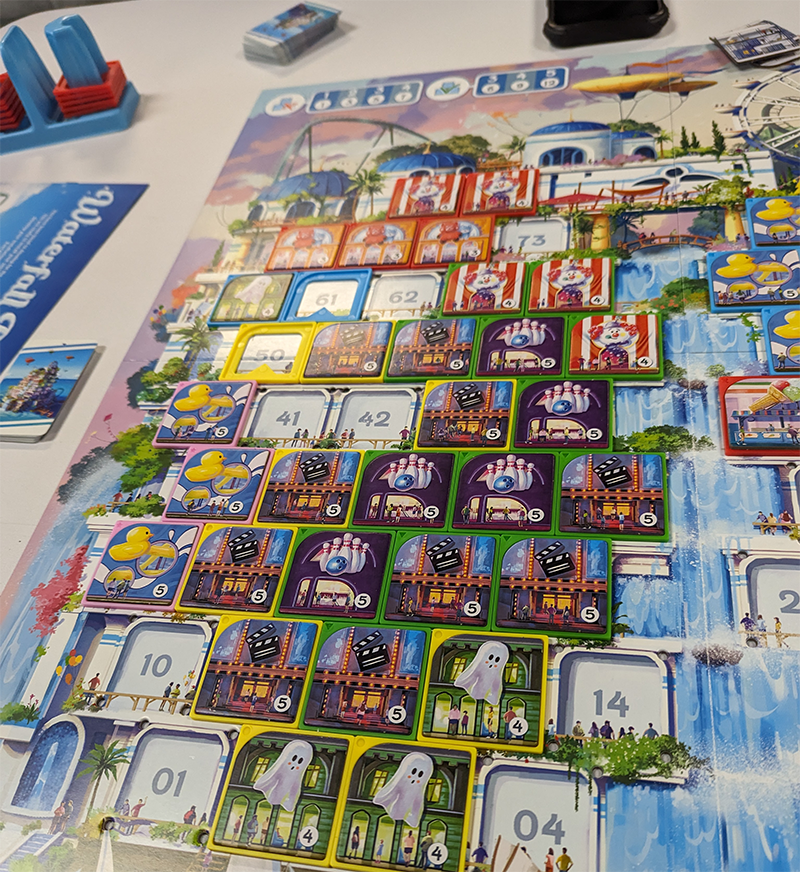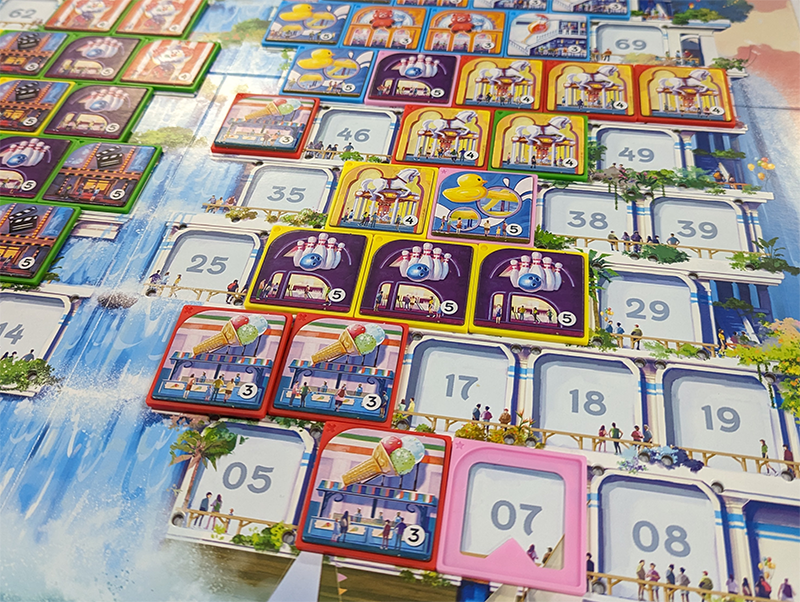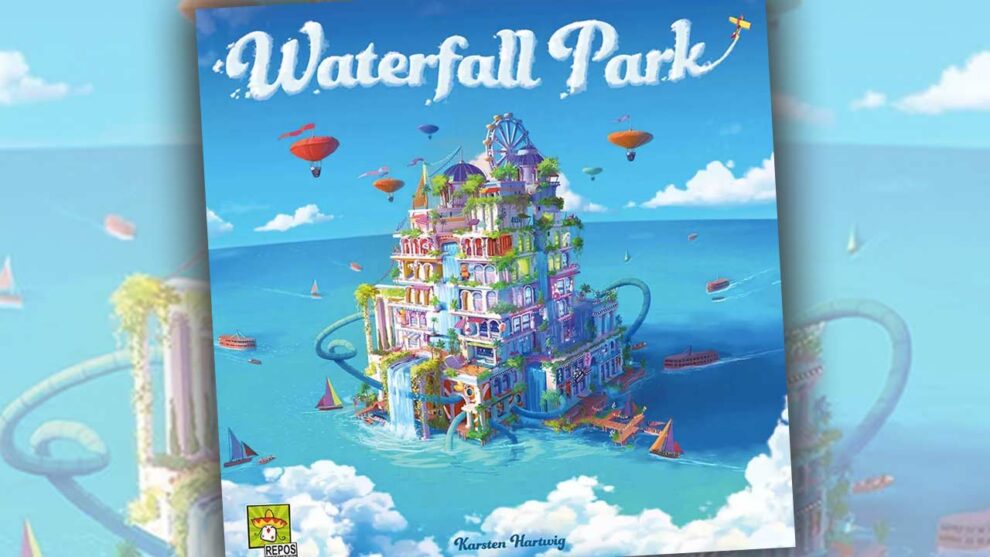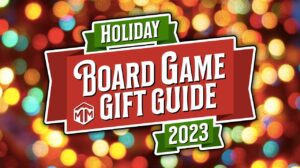Okay, this is becoming a bit much for me. Not too long ago, I reviewed Robo Rally and Acquire, two games that have been around for decades, and a new edition was printed this year. Now here I am reviewing Waterfall Park, a remake of the 1999 negotiation game Chinatown. What is old is new again, and board games have become Hollywood.
Waterfall Park may appear on the surface to be a simple reprint of Chinatown with minor changes, but that perception underestimates the thoughtful improvements made to increase accessibility for new players. While Chinatown veterans may lament certain streamlined mechanics, the revisions help lower the learning curve without dulling the classic negotiating gameplay.
But before I go into those details, let’s actually talk about this game. It’s a negotiation game using amusement park real estate as the backdrop. Like every other game involving money, you want to make the most of it at the end of four rounds.

Location, Location, Negotiation
Each round starts out with everyone getting a hand of numbered cards and tiles. These numbered cards represent the land plots on the board, which are split into two different areas. The tiles are attractions, and you will place these attractions on your land to generate income. The trick with these tiles is that they come in sets, so the movie theater requires five tiles to get the full income. You don’t get just five tiles, though; you need them to connect each other on the board, and that means not just having five tiles but five connecting plots of land as well.
Armed with this knowledge, you can understand where the source of the tense negotiations and exchanges comes from. Any type of exchange can be proposed using land tiles, building tiles, and money. You are free to promise trades or future actions, though promises are non-binding and players cannot be held to them.
The key restriction is that once a building tile is placed on the board, it locks into position and cannot be removed, yet it can still be exchanged. This permanence forces you to carefully weigh the short and long-term value of inserting tiles to claim land versus holding them for future exchanges.
Once the exchanges are completed and everyone agrees to move on, you can insert tiles into your land and earn your income. Grab the cash and start again until you hit four rounds.
If that sounds simple, that’s because this game has the Repos Production logo stamped on its box. Known for making easy-to-learn family games with excellent components, Repos could have phoned it in.
But instead, Waterfall Park benefits from the publisher’s hallmarks. The straightforward rulebook allows anyone to quickly start playing. The high-quality pieces, from the sturdy board to the illustrated tiles, make setup a seamless process instead of a barrier to entry. While accessible for even the newest of players, the gameplay still captivates with meaningful decisions.
You Scratch My Park, I’ll Scratch Yours
The changes from the original Chinatown are also outright improvements. It’s only four rounds instead of six, leaving the simple gameplay loop of 45 minutes to an hour instead of the 90 minute sprawl of the original. The plots of land are split into two large areas instead of multiple lots. It still retains the original’s square spaces, yet they are placed in a hexagonal fashion, allowing the land to be adjacent to more spaces and, therefore, encouraging more opportunities for exchanges.
Income is also simplified, allowing a more uniform payout across all sets instead of different payouts of the original game. By smoothing out complexity, Waterfall Park aims to invite a new generation into the tense world of cutthroat negotiation while respecting the spirit of the original. Though different, it is a loving homage rather than a betrayal of its predecessor.
Well, I don’t view it as a betrayal, but there is a certain outcry amongst some purists of the original game concerning the theme change. Chinatown has received criticism throughout the years, with accusations of cultural appropriation and racial stereotyping. I’m not going into this discussion since, as an Armenian, I don’t know anything about media representation because I never had any.

Let the water flow!
My main issue with Chinatown’s original theme is that it lacked coherence with the gameplay. The mechanics of negotiating land deals could have applied to almost any real estate context, such as farms or suburbs, and the Chinese aesthetic felt off. Waterfall Park’s theme makes just as much sense as Chinatown’s. But the new theme has a broader appeal worldwide, which is understandable for refreshing a classic 20 years later. Chinatown had a robust lifespan by hobby game standards, but no title stays in print forever. After two decades, an updated theme provides a logical way to reinvigorate the game. Some evolution was overdue for this venerable design.
If anything, I wish Waterfall Park pushed itself further. In its attempt to be faithful to the original, it does preserve some of its limitations. As a negotiation game, Waterfall Park is extremely light. The only variables you are taking into consideration are the coins, income, tiles, and land. You will always want your land to be grouped up for your tile placement, and you will always want to have sets of tiles for that increased income. The only major concern you have is if you are helping too much of your opponent and keeping an eye on the tiles since there are a limited number of them per set.
Since Waterfall Park is mechanically light, the game expects your group to carry the experience like Atlas. The rules mainly play as background props, and your friends are the main stars of the show. If they aren’t talking to each other, the experience can feel as dignified as getting run over by a Prius or ending your date in a smart car.
One Tile to Rule Them All
On the other side, a chatty group will find enjoyment in this blue-sky colored box. The rules certainly won’t get in the way of the players as they try to discuss exchanges, make empty promises, and form makeshift alliances to get ahead of the pack. With only four rounds, it forces everyone to make deals quickly since a single round represents 25% of potential income. “Waiting it out” isn’t a viable strategy here.
Actually, that might be wrong because that strategy can work at lower player counts. Waterfall Park shines brightest at the full 5 player count, where there is increased competition over limited land and building tiles. With fewer players, the resources are too abundant, reducing the need for tense negotiations. The reasoning behind this is the number of land and tiles you get per round. At higher player counts, you get fewer cards and tiles to work with, making deals essential rather than optional. The feeling of scarcity unlocks Waterfall Park’s full potential. While functional at lower counts, playing at the maximum creates the ideal balance of supply and demand to deliver the full negotiation experience.
In the end, Waterfall Park succeeds as an accessible family-weight board game centered around negotiation. The simple rules allow anyone to quickly start wheeling and dealing. New players will appreciate the gentle learning curve. Seasoned gamers may find it lacks strategic depth, but accessibility is a selling point for casual play. Waterfall Park offers a refreshing new take on a classic design that highlights the universal appeal of haggling over property. For any group wanting to stimulate deal-making and discussion without a steep learning curve, this lightweight negotiation game is a great choice.










